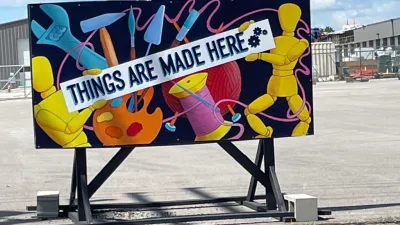In a move that will enable the $350 million redevelopment of Underground Atlanta, the city has agreed to hand over ownership and control of public streets to the developer.
"The city's decision to give several streets near Underground Atlanta to WRS Real Estate, the South Carolina-based developer lined up to purchase and redevelop the shopping mall, rubbed a lot of folks the wrong way," reports Thomas Wheatley.
In an article from earlier in December, Wheatley explains the details of the deal between the city and WRS Real Estate. Underground Atlanta is a $350 million redevelopment project, and the developers will own and control the streets crossing through the mixed-use project.
More reporting on the deal to sign over city streets to WRS Real Estate is available from Lean Stafford from the Atlanta Journal-Constitution and Maria Saporta from the Saporta Report.
The focus of the more recent article by Wheatley, however, is the pragmatic response of advocates concerned about the city's decision. Namely, drinking beer. Specifically, the urbanism advocacy group Thread ATL, is hosting a fundraiser at the Georgia Beer Garden to generate funding for an expected court case.
FULL STORY: Want to help save some Downtown streets? Have a beer.

Maui's Vacation Rental Debate Turns Ugly
Verbal attacks, misinformation campaigns and fistfights plague a high-stakes debate to convert thousands of vacation rentals into long-term housing.

Planetizen Federal Action Tracker
A weekly monitor of how Trump’s orders and actions are impacting planners and planning in America.

In Urban Planning, AI Prompting Could be the New Design Thinking
Creativity has long been key to great urban design. What if we see AI as our new creative partner?

King County Supportive Housing Program Offers Hope for Unhoused Residents
The county is taking a ‘Housing First’ approach that prioritizes getting people into housing, then offering wraparound supportive services.

Researchers Use AI to Get Clearer Picture of US Housing
Analysts are using artificial intelligence to supercharge their research by allowing them to comb through data faster. Though these AI tools can be error prone, they save time and housing researchers are optimistic about the future.

Making Shared Micromobility More Inclusive
Cities and shared mobility system operators can do more to include people with disabilities in planning and operations, per a new report.
Urban Design for Planners 1: Software Tools
This six-course series explores essential urban design concepts using open source software and equips planners with the tools they need to participate fully in the urban design process.
Planning for Universal Design
Learn the tools for implementing Universal Design in planning regulations.
planning NEXT
Appalachian Highlands Housing Partners
Gallatin County Department of Planning & Community Development
Mpact (founded as Rail~Volution)
City of Camden Redevelopment Agency
City of Astoria
City of Portland
City of Laramie




























